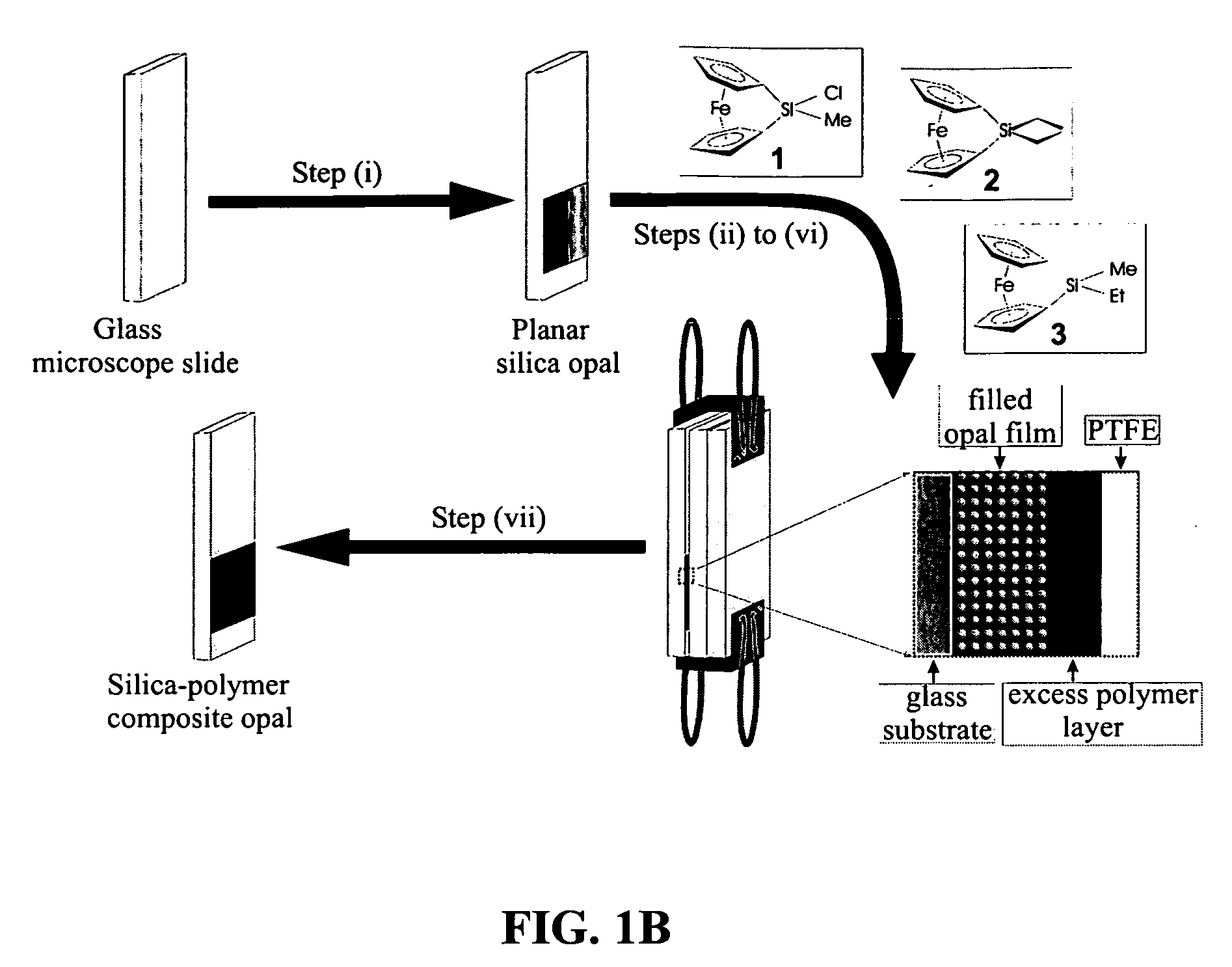Widely wavelength tuneable polychrome colloidal photonic crystal device
a colloidal photonic crystal, wide-wavelength technology, applied in the direction of instruments, non-metal conductors, camera filters, etc., can solve the problems of poor mechanical stability, system still suffers from the same fundamental drawbacks, and prevents the ability to accurately control the features of the bragg optical diffraction peak
- Summary
- Abstract
- Description
- Claims
- Application Information
AI Technical Summary
Benefits of technology
Problems solved by technology
Method used
Image
Examples
example 1
Synthesis of Planarized Colloidal Photonic Crystal-Metallopolymer-Gel Network
[0067]To put the present method in perspective, the materials investigated in this study are planarized composite colloidal photonic crystals comprised of an ordered fcc arrangement of sub-micrometer disconnected microspheres in a matrix of weakly crosslinked poly(ferrocenylsilane) (PFS), a swellable redox-active metallopolymer gel, that is, metallopolymer gel, K. Kulbaba, M. J. MacLachlan, C. E. B. Evans, I. Manners, Macromol. Chem. Phys. 202, 1768 (2001).
[0068]This new class of metallopolymer-colloidal crystal composites with metal atoms integrated directly the backbone of the metallopolymer matrix overcome deficiencies in organic polymer analogues, like the class represented by but not limited to polyacrylamides, as well as introduce additional functionality by virtue of the metal-containing metallopolymer used.
[0069]Poly(ferrocenylsilane) PFS, featured in this invention is a metallopolymer whose main ch...
example 2
Synthesis of Planarized Colloidal Photonic Crystal-Metallopolymer-Gel Network Without Polymer Overlayer, by Melt Infiltration
[0079]The method detailed here describes the fabrication of planarized composite colloidal photonic crystals consisting of an ordered fcc arrangement of sub-micrometer disconnected silica spheres in a matrix of weakly crosslinked PFS as per Example 1. In the previous example the material is produced with a polymer overlayer of variable thickness, whereas in this example the polymer overlayer is reproducibly less than a sphere diameter. A schematic of the procedure is shown in FIG. 7. This first step consists of cleaning a glass microslide by sonication in acetone followed by water. It is then placed on a silicon wafer, which has been cleaned in piranha (see previous example), water, then dried and exposed to perfluorooctyltrichlorosilane to make it non-adhesive. Glass microslips of 0.1 mm thickness are used as spacers between the glass slide and the silicon wa...
example 3
Optical Properties of Liquid Solvent Tuneable Planarized Colloidal Photonic Crystal-Metallopolymer-Gel Network
[0082]Optical properties of both dry and solvent soaked samples were measured in a standard IR cell mounted with a rectangular quartz plate, PTFE spacer and a quartz plate with 2 drilled holes allowing for injection and removal of solvent, squeezed together by a metal frame with a window and tightening screws. A 0.3 mm aperture was affixed to the cell in order to obtain spectra of a small sample area. Spectra were collected using a UV-vis-NIR spectrometer (Perkin-Elmer Lambda 900 model), orienting the sample (111) surface perpendicular to the incident beam using alignment marks. A portion of the experimentally obtained spectra is shown in FIG. 3(a). The peak shown represents selective reflection of a narrow band of wavelengths due to optical Bragg diffraction from the (111) planes of the colloidal photonic crystal, and the secondary maxima on either side of the main peaks ar...
PUM
| Property | Measurement | Unit |
|---|---|---|
| diameters | aaaaa | aaaaa |
| thick | aaaaa | aaaaa |
| thick | aaaaa | aaaaa |
Abstract
Description
Claims
Application Information
 Login to View More
Login to View More - R&D
- Intellectual Property
- Life Sciences
- Materials
- Tech Scout
- Unparalleled Data Quality
- Higher Quality Content
- 60% Fewer Hallucinations
Browse by: Latest US Patents, China's latest patents, Technical Efficacy Thesaurus, Application Domain, Technology Topic, Popular Technical Reports.
© 2025 PatSnap. All rights reserved.Legal|Privacy policy|Modern Slavery Act Transparency Statement|Sitemap|About US| Contact US: help@patsnap.com



